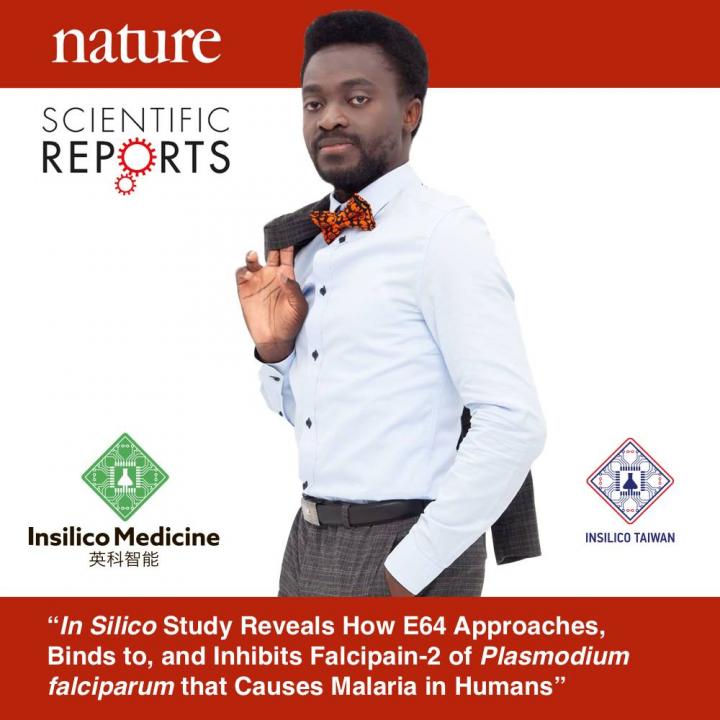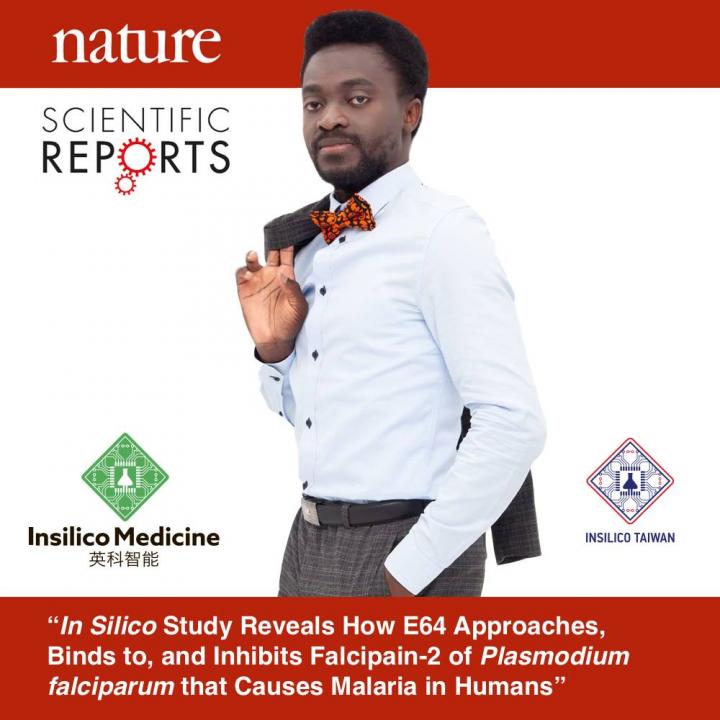
Credit: Insilico Medicine, Inc.
Monday, November 12, 2018, Taipei, Taiwan, Republic of China – Insilico Taiwan, a Taipei-based subsidiary of Insilico Medicine, developing the end-to-end drug discovery pipeline utilizing the next generation artificial intelligence, announces the publication of a new research paper titled "In Silico Study Reveals How E64 Approaches, Binds to, and Inhibits Falcipain-2 of Plasmodium falciparum that Causes Malaria in Humans" in Scientific Reports – a scientific journal published by the Nature Publishing Group.
Malaria is one of the world's oldest infectious diseases that still causes a lot of health problems in many tropical countries. Plasmodium falciparum, the most dangerous human malaria parasite, is believed to cause hundreds of millions of illnesses and about half a million deaths a year. Plasmodium falciparum causes malaria in humans by destroying human haemoglobin through falcipain-2 (FP2). Inhibitors of FP2 block haemoglobin destruction and parasite development, suggesting that FP2 inhibition is a promising target for antimalarial therapy.
The control of malaria has been hindered by increasing resistance of malaria parasites to available drugs. New antimalarial drugs, ideally directed against new targets, are urgently needed. To encounter this challenge, researchers from Insilico Taiwan have extensively studied the mechanisms by which the protease inhibitor E64 approaches, interacts with, and inhibits FP2. The effectiveness of E64, its mechanism of action, and the potentials of the derivatives of E64 to have low toxicity in humans make E64 and its derivatives potential drug candidates to treat diseases with high levels of cysteine proteases as a primary cause.
Results of the study have shown that the binding of E64 and FP2 are facilitated by the amino acids of FP2 located within and nearby the previously identified binding pocket of FP2. This suggests that the antimalarial drug design should not only focus on finding drug candidates that will bind tightly to the residues of established binding pocket, but also consider the need for the drug candidate to be able to bind to the residues surrounding the established binding pocket subsites.
"Teams of Insilico Medicine and Insilico Taiwan are dedicated to solving the most challenging problems in healthcare. We have brilliant scientists working 24/7 to help people all over the world. Insilico Taiwan is happy to present the work on malaria which potentially can help save millions of lives", says Artur Kadurin, CEO Insilico Medicine Taiwan
Results of the study confirm that E64 is able to inhibit FP2, and explains in detail the physicochemical factors of E64's interaction with FP2 as extremely favorable.
"As a Senior Scientist at Insilico Taiwan, I have the opportunity of leading a team of Deep Learning Engineers applying cutting-edge techniques in Drug Discovery. It is a very fascinating experience for me working with our team on solving the malaria which remains one of the deadliest diseases killing about half a million people annually", says Dr. Emmanuel Salawu, who holds a Ph.D. in Bioinformatics, and a second Ph.D. in Epidemiology.
###
Insilico Medicine and Longenesis are working on Malaria.AI a data-driven and AI-powered system for tracking and preventing malaria.
###
Insilico Medicine is regularly publishing research papers in peer-reviewed journals. The company was first to apply the generative adversarial networks (GANs) to the generation of the new molecular structures with the specified parameters and published a seminal peer-reviewed paper submitted in June 2016. The concept was further extended and augmented with advanced memory and reinforcement learning. One of the latest papers published in the Journals of Gerontology demonstrated the application of the deep neural networks to assessing the biological age of the patients. The latest special issue in Molecular Pharmaceutics featured several research papers by Insilico Medicine.
For further information, images or interviews, please contact:
Contact: Klug Gehilfer
[email protected]">[email protected]
Website: http://insilico.com/
Please follow the link below to read the article: https://www.nature.com/articles/s41598-018-34622-1
About Insilico Medicine, Inc
Insilico Medicine is an artificial intelligence company headquartered in Rockville, with R&D and management resources in Belgium, Russia, UK, Taiwan, and Korea sourced through hackathons and competitions. The company and its scientists are dedicated to extending human productive longevity and transforming every step of the drug discovery and drug development process through excellence in biomarker discovery, drug development, digital medicine, and aging research.
Insilico pioneered the applications of the generative adversarial networks (GANs) and reinforcement learning for generation of novel molecular structures for the diseases with a known target and with no known targets. In addition to working collaborations with the large pharmaceutical companies, the company is pursuing internal drug discovery programs in cancer, dermatological diseases, fibrosis, Parkinson's Disease, Alzheimer's Disease, ALS, diabetes, sarcopenia, and aging. Through a partnership with LifeExtension.com, the company launched a range of nutraceutical products compounded using the advanced bioinformatics techniques and deep learning approaches. It also provides a range of consumer-facing applications including Young.AI.
In 2017, NVIDIA selected Insilico Medicine as one of the Top 5 AI companies in its potential for social impact. In 2018, the company was named one of the global top 100 AI companies by CB Insights. In 2018 it received the Frost & Sullivan 2018 North American Artificial Intelligence for Aging Research and Drug Development Award accompanied with the industry brief. Brief company video: https://www.youtube.com/watch?v=l62jlwgL3v8. http://www.insilico.com
Media Contact
Qingsong Zhu
[email protected]
240-641-6266
@InSilicoMeds
http://www.insilicomedicine.com
Related Journal Article
http://dx.doi.org/10.1038/s41598-018-34622-1





